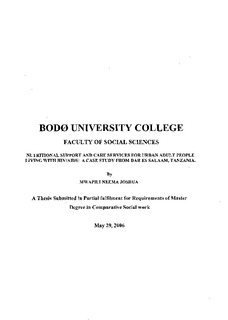| dc.description.abstract | It is well known that nutritional status plays an important role in preventing opportunistic
infections as it improves immunity system. Not so rnuch is known about how people living
with HTV/AIDS manage their nutrition and thc difficulties encountered in accessing support
and other services necessary for maintaining their nutrition and health and improve quality of
li fe.
In this study, persons with HIVIAIDS wcre asked to tell about nutrition support and care
services provided by both formal and informal institutions in the society. Using a scmistructured
interview guide in this study, the author conducted in-depth interviews with ten
intervicwccs of both men and women. Information was also obtained fiom informants fiom
relevant organisations espccially AIDS Service organisation (ASOs), and departments in
ininistries. Thematic approach was employed in data analysis. The categories identified to
explain the problems of the HIV-positive persons in managing their nutrition and health
included Nutrition perception and knowledge, source of income and stigma related to
HIVIAIDS. Others were adherence and access to medication and medical monitoring,
gender related cultural practices in the society, support from informal and formal
institutions, and challenges for NGOs in providing services.
The findings from this study showed that a large number of people living with HIV/AIDS rely
on AIDS organisations for support services they need. Access to services in public institutions
like governrnent hospitals was difficult. The findings als0 show that support for people living
with HIVIAIDS from relatives was limited and this could be due to stigma attached to the
disease and difficult economic situation whereby relatives have little resources for their own
families. In addition, challenges to meet basic life need for themselves and their families
were found to be important concern for interviewees.
This study calls for more research on nutrition and experiences of people with HIVIAIDS
about their health and nutritional management. This will give understanding on how already
infected individuals and affected families can be supported in order to live as long as possible
without progressing into AIDS disease. | en |
